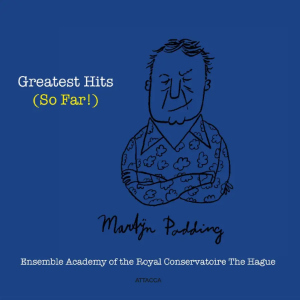
Martijn Padding (b. 1956)
Greatest Hits (So Far!)
Last Words (2010)
Slow Landscape (with thunder) (2016)
Unequal Parts (2016)
Diederik Smulders (cello)
Felicia van den End (bass flute)
Rutger Janssen (piano)
Ensemble Academy of the Royal Conservatoire, The Hague/Gregory Charette, Andreas Hansson
rec. 2020/21, Arnold Schönbergzaal, Royal Conservatoire, The Hague, The Netherlands
Attacca ATT2024169 [52]
This recording is the swan song of a concert hall being, as far as I know, the last to be made in the Royal Conservatoire’s Arnold Schönbergzaal before that institute moved to its new location in the Amare building in The Hague in 2021. After briefly being used to house Ukranian refugees we watched the old brutalist building being torn down in 2023, with the always surreal view of familiar interior walls and spaces filled with memories exposed to daylight or covered in rubble and dust.
“I really like composing concerts” declares Martijn Padding at the beginning of the booklet notes. He means concertos of course, and no, I didn’t translate the Dutch text, but this reminds us that Padding has previously been called upon to make concertos for ‘underdog’ instruments such as mandolin, harmonium, bass flute and clavichord, we are further reminded that he gained the honorary title of “head of pathetic instruments” (“Hoofd zielige instrumenten”) in the press. Aside from the bass flute, which these days is easily found in consort ensembles and a fair amount of contemporary music but wouldn’t normally be considered a solo instrument for a concerto, we have the distinctly non-pathetic cello and piano in a set of concertos that all breathe new life into this genre.
Last Words for cello and ensemble is a lively work full of energy and good humour. This is virtuoso writing for both soloist and ensemble, with fascinating and detailed sonorities that make you sit up and take notice from the start. Padding has evolved a distinctive style that is eclectic while avoiding stereotype – it’s very ‘Dutch’ without being full of heavy low clouds and sentimentality. Melodic fragments and cadences fly past with nervous energy, but the keenly observed instrumentation and flow of material is always engaging and enjoyable – this is contemporary music with an edge that Is not painful and doesn’t make you bleed. Moments that make your eyebrows rise include a keyboard sound at 5:00 into the first movement, and there are visual gags that you probably won’t initially notice from the recording such as the cello player accompanying themselves on a pedal hi-hat in the second movement. Percussion is a feature in this colourful concerto but is used with pointed detail as accurate as every other note, and all of this is given a demonstration quality recording in which all subtleties can be heard, as well as that familiar ricochet from the acoustic audible in the fourth minute of the second movement.
Slow Landscape (with thunder) for bass flute and ensemble is the ‘adagio’ in this collection of works, with the low tones of the soloist accommodated “mainly in the softer and slower regions of the spectrum.” Padding admits that this ‘dreamy’ kind of piece is not typical of his work, but as ever he has a keen ear for unusual sonorities. The keyboard appears again with a whistle sample, the chords of which glissando over the flute, picking up its overtones from time to time and dressing them in striking garb, from a warm overcoat to the kind of signal you used to get playing between stations on an analogue radio. The surreal nature of the music derives in part from subtle amplification of soloist, percussion and piano that adds reverb rather than volume, contrasting with the ‘dry’ space around the other instruments. The music ranges over a 14-minute span from chillingly atmospheric to movingly expressive, with perhaps an inevitable association with Japanese stillness encouraged by the nature of the solo instrument.
Unequal Parts for piano and ensemble has the largest group of musicians, but the richness of sound is still made by only 17 people plus soloist. There is a Kurt Weill/Weimar feeling to this and the ensemble for Last Words that has a refined sense of lightness and transparency to go along with Padding’s characteristic wit and boundless but well-directed energy. The reedy sounds of an accordion (bajan) are part of a wide variety of sonorities, with winds, percussion and strings having enough heft to create masses of dynamic contrast to go along with the mad virtuosity demanded of the soloist when in full cry during the Fast first of two movements. The character of this piece is reflected in its title, with the second Slow movement a more introvert span in which the piano notes are restricted to quick inflections, swallowing the melody but at its soloistic peak creating “a kind of Kamikaze cadenza”. Words do none of this music justice, you really just have to hear it.
As ever with these Dutch things this CD was pressed into my hand by a colleague at the Royal Conservatoire, and I know or have known many of the people involved in its performance and production. This has no bearing on the pleasant surprise I was given by the quality of every aspect of this recording and am happy to be able to report that it is world class and deserving of a very wide audience indeed. This is much more than a souvenir of a lost concert hall, and more an encouraging sign that new music is very much alive and well, or at least was in 2020/21, against all of the odds.
Dominy Clements
Buying this recording via a link below generates revenue for MWI, which helps the site remain free


















